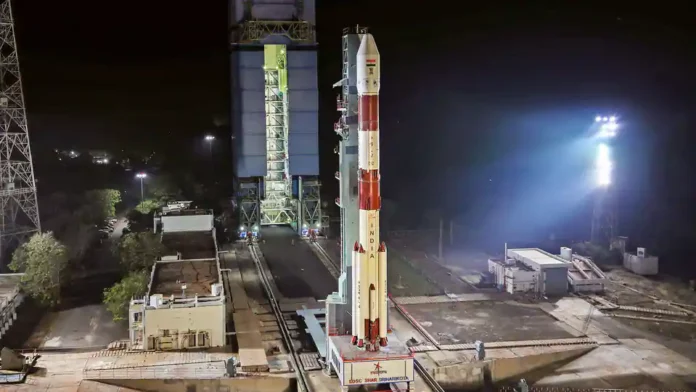French company Arianespace successfully launched the GSAT-24 satellite from Kourou in French Guiana, which was developed by ISRO for NewSpace India Limited (NSIL) (South America). GSAT-24 is a 4180 kg 24-Ku band communication satellite that provides pan-India coverage for DTH application requirements.
It was NSIL first “demand driven” communication satellite mission following reforms to the space industry.
BENGALURU: NewSpace India Limited (NSIL), leasing the whole capacity on board to Direct-to-Home (DTH) service provider Tata Play, launched GSAT-24 in its first “demand-driven” communication satellite mission following space sector reforms.
The satellite was successfully launched into geostationary orbit on Thursday by the French company Arianespace’s Ariane 5 rocket from Kourou in French Guiana (South America), where it was built by the Indian Space Research Organization for NSIL.
GSAT-24 is a 4180 kg 24-Ku band communication satellite that provides pan-India coverage for DTH application requirements.
The commercial arm of ISRO, NSIL was established in March 2019 and is a Central Public Sector Enterprise (CPSE) under the Department of Space (DOS). NSIL was required to carry out operational satellite missions on a “demand driven”
model as part of the “space reforms” announced by the government in June 2020. Under this model, NSIL is responsible for building, launching, owning, and operating satellites as well as providing services to its devoted customer. To suit the needs of its devoted customer Tata Play, the DTH division of the Tata Group, the whole satellite capacity on board GSAT-24 will be leased.
Two satellites, MEASAT-3d for the Malaysian operator MEASAT and GSAT-24, were successfully launched into geostationary orbit by the Ariane 5 after being carried aboard an Ariane-V VA257 flight from the Guiana Space Centre, Europe’s spaceport in Kourou.
The 15-year mission life of GSAT-24 is configured on ISRO’s tried-and-true I-3k Bus. An NSIL official explained, “‘Demand-driven’ mode basically means one will know who the end customers are going to be and what’s the kind of utilisation and commitment when satellite is launched so that you have extremely effective utilisation of this satellite capacity once it goes into orbit.
The official stated, “In the past, the manner was more supply driven, with capacity being leased after the launch with little to no clear commitment by customers beforehand.”
“NSIL is responsible for fully funding the entire mission, including the satellite, launch, launch campaign, insurance, transportation, and in-orbit upkeep and support. NSIL will fully own and operate the satellite after it is in orbit “Radhakrishnan Durairaj, the chairman and managing director of NSIL, told PTI.
Follow and connect with us on Facebook, LinkedIn & Twitter.

